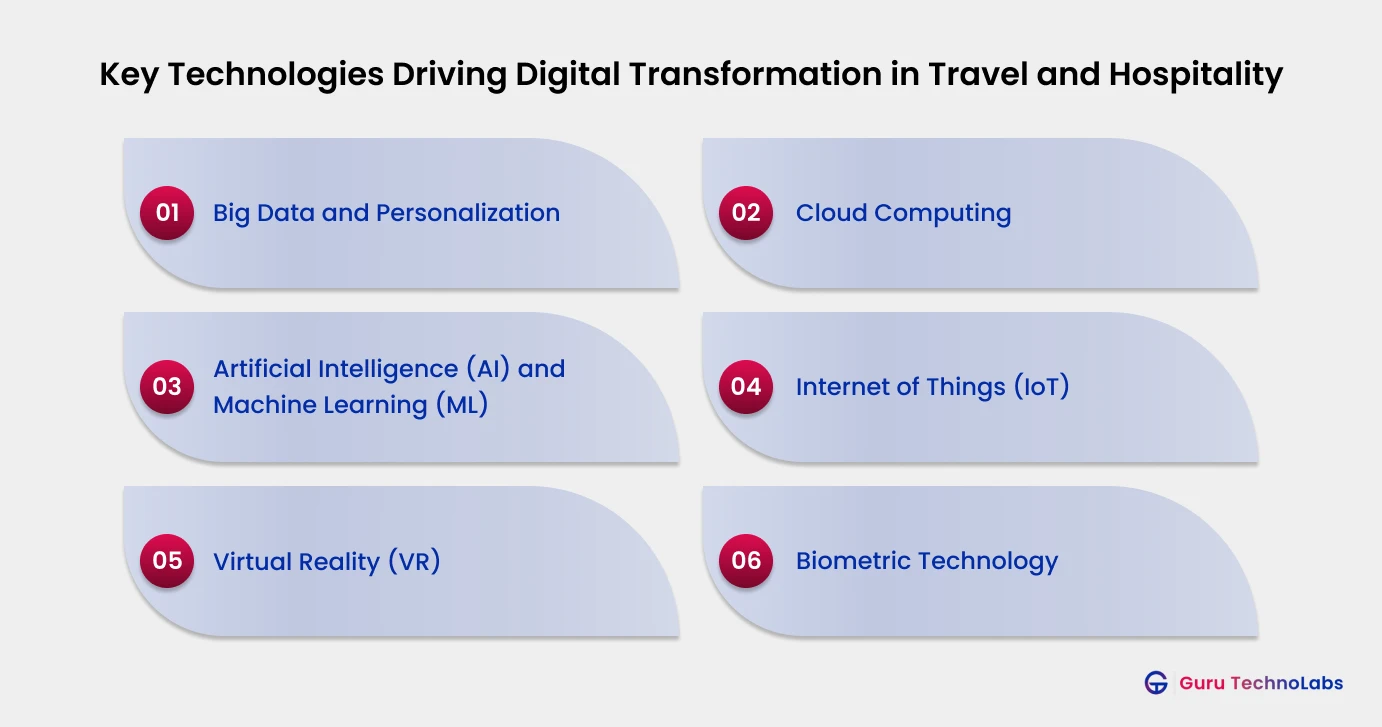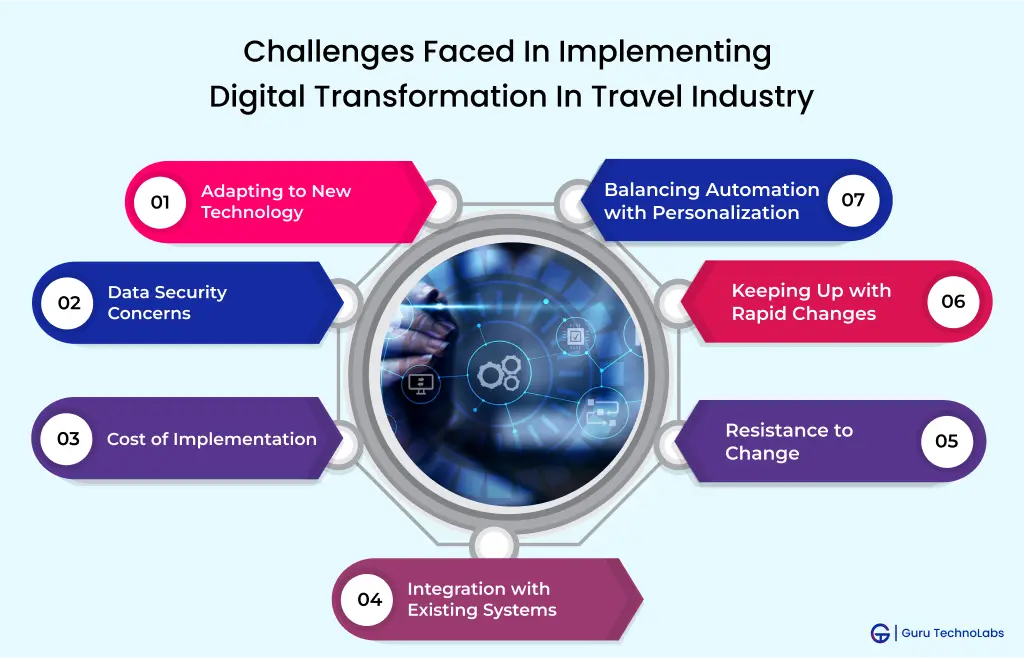Digital Transformation In Travel and Tourism Industry

The digital transformation in the travel industry is more than just adopting new technology; it’s about rethinking how travel businesses operate, engage with customers, and deliver experiences. As travelers demand more personalized, seamless, and contactless journeys, firms across the globe are embracing digitalization in the travel industry to stay competitive.
In this guide, we’ll explore what digital transformation in travel and tourism really means, how it’s reshaping the sector, and how travel businesses can implement it successfully.
The world of travel and tourism has undergone a significant transformation in recent years, mainly due to technological advancements. This transformation has brought about a variety of changes, including the way we plan and book our trips, the experiences we have while we travel, and even how we share our experiences with others.
What is Digital Transformation in Travel and Tourism?
Digital transformation in travel and tourism means using digital technologies in smart ways across all parts of a travel business to make operations smoother, keep customers happy, and bring new ideas to life. It’s not just about using technology, it’s about using it wisely to create real value.
Key Benefits:
- Real-time booking and 24/7 accessibility
- Enhanced customer engagement through personalization
- Improved decision-making with data-driven insights
- Contactless and secure travel experiences
- Operational efficiency and automation
What Is the Impact of Digital Transformation on the Travel Industry?
The impact of digital transformation in the travel industry is evident across every customer touchpoint. From planning a trip to the final feedback email, technology is involved at every stage.
Key Impacts:
- Mobile-first booking experiences
- AI-based itinerary planning
- Automated check-ins and payments
- Personalized travel deals and offers
- Real-time customer support via chatbots
These impacts are driven by powerful technologies. Let’s dive into the tech behind the transformation.
Key Technologies Driving Digital Transformation in Travel and Hospitality
As the demand for convenience, personalization, and speed grows, modern technologies are reshaping how travel businesses operate. Let’s explore the top technologies along with real-world examples to see how they’re applied effectively.

Big Data and Personalization
Big data allows travel companies to analyze user behavior, booking trends, and customer feedback to create personalized travel experiences. By leveraging this data, businesses can send customized offers, recommend relevant destinations, and improve customer satisfaction.
Example:
Expedia uses big data analytics to tailor hotel recommendations, flight deals, and vacation packages based on a user’s browsing and booking history.
Cloud Computing for Operational Efficiency
Cloud computing enables travel businesses to manage operations more efficiently by offering centralized access to data, real-time collaboration, and easy scalability. It reduces dependence on local servers, allowing for smoother booking systems and better disaster recovery.
Additionally, integrating with top Global Distribution Systems (GDS) like Amadeus or Sabre empowers travel businesses streamline bookings across multiple platforms.
Example:
Airbnb runs its global platform on Amazon Web Services (AWS) to ensure scalability, data security, and seamless user experiences for millions of hosts and guests.
AI and ML for Enhanced Customer Experiences
AI and ML enhance the customer journey through chatbots, dynamic pricing, smart search filters, and recommendation engines. These technologies help automate repetitive tasks, predict user needs, and provide 24/7 virtual assistance. Beyond travel, the adoption of AI in hospitality is also transforming how hotels personalize guest experiences and optimize operations.
Example:
KAYAK uses an AI-powered assistant that helps travelers book flights, check prices, and manage itineraries via voice and chat, providing real-time help and updates.
IoT For Seamless Travel Experiences
IoT connects physical devices like smart luggage, hotel room controls, and airport kiosks to the internet, offering travelers more control and convenience. It enhances security, tracking, and personalized experiences throughout the journey.
Example:
Delta Airlines uses RFID-enabled baggage tags, allowing passengers to track their luggage in real-time using the Fly Delta app, reducing lost baggage issues.
Virtual Reality in Travel
VR allows users to explore destinations, hotels, and tours virtually before making a booking decision. It builds trust, reduces uncertainty, and improves the user experience by offering an immersive preview of the travel product.
Example:
Marriott Hotels offers VR tours of their rooms and facilities, allowing potential guests to virtually walk through the property before completing their reservation.
Biometric Technology for Security
Biometric systems like facial recognition and fingerprint scanning are speeding up identity verification in airports and hotels. They improve both security and efficiency by reducing wait times and eliminating the need for manual check-ins.
Example:
Dubai International Airport uses biometric Smart Gates that scan faces and irises to allow travelers to pass through immigration quickly, without needing to show a passport.
Knowing the technology is one part, the real challenge is implementing it. Here’s how travel businesses can begin their transformation journey.
Transform Your Travel Business with Expert Digital Solutions
Struggling to keep up with tech-savvy travelers and rising competition? Our Digital Transformation Services are designed to modernize your travel operations, automate
workflows, and delight customers at every touchpoint.
✅ Tailored digital strategy for your travel business
✅ AI, cloud, and automation tools to boost efficiency
✅ Fast implementation with measurable results
How Can Travel Businesses Start Their Digital Transformation Journey?
Embarking on a digital transformation journey doesn’t have to be expensive or complex. Even small and mid-sized travel companies can start with simple, strategic steps to modernize their operations, enhance customer experiences, and stay competitive.
Here’s how to begin the journey toward digital transformation in the travel industry:
| Steps | Action | Why It Matters |
|---|---|---|
| 1. Evaluate Current Systems | Audit your existing tools, software, and workflows. | Identifies inefficiencies and outdated processes slowing you down. |
| 2. Pinpoint Customer Pain Points | Understand common issues (slow booking, lack of personalization, delays). | Helps you prioritize what to fix first to improve user experience. |
| 3. Define Measurable Goals | Set clear KPIs like reducing wait time or increasing online bookings. | User-friendly, smartpoint, Red Apps |
| 4. Choose Scalable Tech Solutions | Start with cloud CRM, mobile apps, or AI chatbots. | Scalable tools grow with your business without heavy upfront costs. |
| 5. Upskill Your Team | Train staff to use new tools and encourage a digital-first mindset. | Drives adoption and long-term success from within your company. |
What Are The Key Challenges Of Implementing Digital Transformation In The Travel Sector?

Building a future-proof digital transformation roadmap is becoming increasingly important in the travel industry. Here’s a list of the key challenges that travel business owners might face while implementing digital transformation in the travel sector:
1. Adapting to New Technology: One of the most significant difficulties people face is adapting to new technology. It can be challenging to learn how to use new digital tools and systems, especially for those unfamiliar with technology. This is especially true for businesses and their staff who are not tech-savvy.
2. Data Security Concerns: As travel businesses rely more on digital systems, there is a growing concern about data security. The risk of data breaches and cyberattacks is increasing, and travel businesses must safeguard their customers’ information.
Protecting sensitive data is a significant priority for travel businesses, and they need to take all necessary measures to ensure the security of their systems and prevent any potential data breaches or cyberattacks.
3. Cost of Implementation: Implementing new digital technologies into a business can be expensive. The costs involved in purchasing software and training staff can quickly add up, particularly for small businesses with limited budgets.
4. Integration with Existing Systems: If you’re in the travel industry, you may already have systems and processes to help you run your business. Adding new digital technologies can be tricky and might take more time and resources than expected. Properly integrating these new technologies with your existing systems is essential to avoid complications.
5. Resistance to Change: People are not uncommon to be uncertain about change. This can apply to both employees and customers. Encouraging employees to adopt new digital tools and convincing customers to use them can be difficult.
6. Keeping Up with Rapid Changes: The world of technology and trends is constantly changing, especially in the travel industry. It can be challenging to keep up and ensure your business stays up to date, but it’s important to stay current to remain relevant and competitive in the market.
7. Balancing Automation with Personalization: Businesses need to find the right balance between using technology to speed things up and giving customers a personal experience. While automation can make things more efficient, it can also make customers feel like they’re not necessary. So, it’s important to use automation wisely and personalize the experience for each customer to build and maintain good relationships.
Turn Travel Challenges into Digital Opportunities
Whether you run a travel agency, OTA, or hotel chain, digital transformation can drive
your growth. Let us help you automate operations,
personalize user journeys, and increase ROI.
✅ Strategy backed by proven results
✅ Scalable, future-proof tech solutions
✅ 1-on-1 expert guidance from Day 1
Conclusion
The digital transformation in the travel industry is revolutionizing how businesses operate and how travelers plan and experience their journeys. From enhanced personalization to streamlined operations, digital technologies are shaping the future of travel and tourism.
Here’s a quick recap of key takeaways:
- Digital transformation in travel and tourism means adopting technologies to improve efficiency, customer service, and business scalability.
- Technologies like AI, big data, IoT, cloud computing, VR, and biometrics are driving innovation across the sector.
- Digitalization in the travel industry enhances personalization, speeds up bookings, automates tasks, and builds loyalty.
- Implementing transformation requires a well-structured roadmap, clear strategy, and commitment from leadership.
- Challenges such as high costs, system integration, and internal resistance can be managed with the right approach.
- A step-by-step digital roadmap helps travel businesses transform gradually and successfully.
Frequently Asked Questions
Digital transformation benefits the tourism industry by enhancing operations, personalizing customer experiences, expanding market reach, and driving innovation.
Digital transformation is significant for travel businesses to stay ahead of the competition. It helps them adjust to the changing needs and expectations of customers and the market and find new ways to make money by using innovative technologies.
By embracing digital transformation, travel businesses can improve operations, create better customer experiences, and ultimately increase revenue.
To begin a digital transformation journey in travel businesses, assess digital capabilities, identify areas for innovation, create a comprehensive strategy, invest in technology and talent, and continuously evaluate and refine digital initiatives.
Critical digital transformation technologies in travel include big data analytics, artificial intelligence, cloud computing, the Internet of Things, virtual reality, and biometric technology. These technologies enable personalized experiences, operational efficiency, and enhanced security in the travel industry.





















